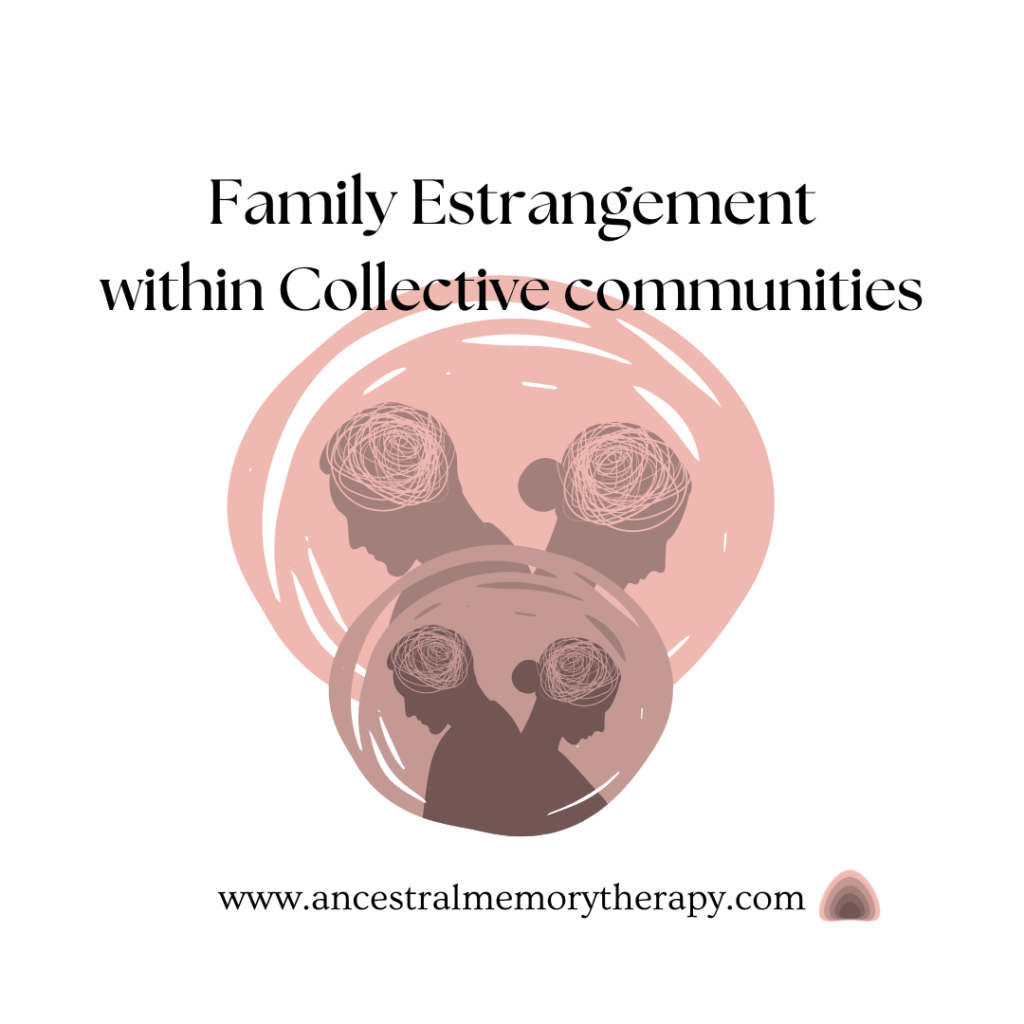Relationships are at the core of our existence. Whether platonic or personal, they are common denominators to the many interactions in our lives. Having disagreements with friends or dissolving relationships hits hard, but we tend to work through those feelings and have less emotional trauma. However, being estranged from family strikes at the core of who we are. With it, BIPOC communities carry shame, embarrassment and sometimes guilt from being ex-communicated from these complex connections.
BIPOC communities are also struck with carrying the context of our history of trauma (from slavery, war, political conflicts, etc.), being torn from our families over time. The unhealed experiences from traumatic events tend to be passed down in unspoken ways. It could be through parents, cultural patterns, or re-living flashbacks from traumatic experiences. Intergenerational trauma can allow unresolved feelings to fester into a host of post-traumatic symptoms like trust issues, resentment, depression and anxiety.
Today, we will discuss the effects of family estrangement in the BIPOC community. We’ll touch upon how to cope with emotional grief, how to move forward on a healing path and the importance of taking the necessary time to restore yourself.
Dealing with emotional grief
Walking the fine line of grief is not an easy feat. The heaviness and overbearing weight of grief can be overwhelming. It’s a whirlwind of internal conflict, pain and profound emotions that can throw you for a loop. But know and understand those feelings are valid, real—and unbelievably common. They are normal responses that can be used to learn and identify where you are at that moment. These emotions will help protect your well-being in the long run, providing you with insight and guidance.
You’ll also have to cope with how to fill the void of missing family members you’ve been estranged from. Communicate with other family members. Find out if they have feelings of trauma they’re coping with too, and tell them how you’re feeling. Create a safe setting to share and support each other. Also, allow yourself the space to be alone with your feelings and ask questions. In moments of solitude, you can find clarity. And to add to that—when in need, seek support. There are many types of trauma-focused psychotherapies that provide support for the BIPOC community to process intergenerational trauma.
The pull and tug of emotional efforts
After being estranged, the hope for reconciliation is usually on one’s mind. However, in some instances, loss and loneliness may prompt you to make decisions that are not beneficial to your well-being. Questions like, ‘Did I do enough to resolve the matter?’ or ‘Is there more I can do in this situation?’ will arise. Be honest about your stance in the situation. Self-reflection will help you take that much-needed first step in the right direction.
Finding a median where you maintain clear boundaries is crucial. On one end, you may be working on regulating yourself and moving forward without said member in your life, or on the other end—you may be seeking a resolution. Therefore, ensure that you’re comfortable if a situation to talk develops. Establish healthy boundaries that will help you communicate openly and on even ground. It will set the tone for finding ways to forgive and move forward in the most amicable way possible without the pressures of what used to be.
Making space for new traditions
Your cultural identity is wrapped into every inch of your livelihood with family—from celebrations to a loved one’s passing. It’s expected that you may have unpleasant memories of old traditions. There are many ways to create space for new memories to replace old ones. Call upon the family to alternate environments and support changes to facilitate new beginnings. Or surround yourself with new ancestral artifacts in your house to remind yourself of your rich BIPOC culture.
Reshape your perspective and do what works best for you to work through your post-traumatic symptoms. Ask close friends and family to support you with your new direction. Use measures to help you heal favorably, or find common ground in reconciliation. Keep in mind that your healing journey from emotional trauma will require time and patience. It may be uncomfortable and somewhat painful at times. However, it is part of the process and will help you adapt to new norms. With therapy as an option, you will have someone with you every step of the way advocating for you.




